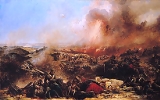
Thomas de Courcy Hamilton
Encyclopedia
Major-General Thomas de Courcy Hamilton VC
(20 July 1825 - 3 March 1908) was a Scottish
recipient of the Victoria Cross
, the highest and most prestigious award for gallantry in the face of the enemy that can be awarded to British
and Commonwealth
forces.
Joining the British Army
as an ensign in the 90th Regiment of Foot (Perthshire Volunteers)
in 1842, he exchanged into the 68th Regiment of Foot in 1848.
during the Crimean War
when the following deed took place for which he was awarded the VC due to his actions at Sebastopol.
"For having, on the night of the 11th May, 1855, during a most determined sortie, boldly charged the enemy, with a small force, from a battery of which they had obtained possession in great numbers, thereby saving the works from falling into the hands of the enemy. He was conspicuous on this occasion for his gallantry, and daring conduct".
He retired from the army in 1872 as a Brevet colonel.
Victoria Cross
The Victoria Cross is the highest military decoration awarded for valour "in the face of the enemy" to members of the armed forces of various Commonwealth countries, and previous British Empire territories....
(20 July 1825 - 3 March 1908) was a Scottish
Scotland
Scotland is a country that is part of the United Kingdom. Occupying the northern third of the island of Great Britain, it shares a border with England to the south and is bounded by the North Sea to the east, the Atlantic Ocean to the north and west, and the North Channel and Irish Sea to the...
recipient of the Victoria Cross
Victoria Cross
The Victoria Cross is the highest military decoration awarded for valour "in the face of the enemy" to members of the armed forces of various Commonwealth countries, and previous British Empire territories....
, the highest and most prestigious award for gallantry in the face of the enemy that can be awarded to British
United Kingdom
The United Kingdom of Great Britain and Northern IrelandIn the United Kingdom and Dependencies, other languages have been officially recognised as legitimate autochthonous languages under the European Charter for Regional or Minority Languages...
and Commonwealth
Commonwealth of Nations
The Commonwealth of Nations, normally referred to as the Commonwealth and formerly known as the British Commonwealth, is an intergovernmental organisation of fifty-four independent member states...
forces.
Joining the British Army
British Army
The British Army is the land warfare branch of Her Majesty's Armed Forces in the United Kingdom. It came into being with the unification of the Kingdom of England and Scotland into the Kingdom of Great Britain in 1707. The new British Army incorporated Regiments that had already existed in England...
as an ensign in the 90th Regiment of Foot (Perthshire Volunteers)
90th Regiment of Foot (Perthshire Volunteers)
The 90th Regiment of Foot was a Scottish infantry regiment of the British Army, active from 1794 to 1881.The 90th was raised in 1794 for service during the French Revolutionary Wars, and later the Napoleonic Wars. In the post-war period the regiment saw action inSouth Africa, serving in the 7th...
in 1842, he exchanged into the 68th Regiment of Foot in 1848.
Details
He was 27 years old, and a captain in the 68th Regiment of Foot (later The Durham Light Infantry), British ArmyBritish Army
The British Army is the land warfare branch of Her Majesty's Armed Forces in the United Kingdom. It came into being with the unification of the Kingdom of England and Scotland into the Kingdom of Great Britain in 1707. The new British Army incorporated Regiments that had already existed in England...
during the Crimean War
Crimean War
The Crimean War was a conflict fought between the Russian Empire and an alliance of the French Empire, the British Empire, the Ottoman Empire, and the Kingdom of Sardinia. The war was part of a long-running contest between the major European powers for influence over territories of the declining...
when the following deed took place for which he was awarded the VC due to his actions at Sebastopol.
"For having, on the night of the 11th May, 1855, during a most determined sortie, boldly charged the enemy, with a small force, from a battery of which they had obtained possession in great numbers, thereby saving the works from falling into the hands of the enemy. He was conspicuous on this occasion for his gallantry, and daring conduct".
He retired from the army in 1872 as a Brevet colonel.
External links
- Location of grave and VC medal (Gloucestershire)

